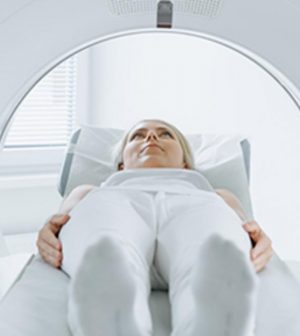- Could Your Grocery Store Meat Be Causing Recurring UTIs?
- Are You Making This Expensive Thermostat Error This Winter?
- Recognizing the Signs of Hypothyroidism
- 10 Strategies to Overcome Insomnia
- Could Artificial Sweeteners Be Aging the Brain Faster?
- Techniques for Soothing Your Nervous System
- Does the Water in Your House Smell Funny? Here’s Why
- Can a Daily Dose of Apple Cider Vinegar Actually Aid Weight Loss?
- 6 Health Beverages That Can Actually Spike Your Blood Sugar
- Treatment Options for Social Anxiety Disorder
MRI May Predict Who’ll Respond Best to Schizophrenia Treatment

Specialized brain scans may accurately predict whether a psychotic patient will go on to develop treatment-resistant schizophrenia, Dutch researchers report.
The scan — called a neuromelanin-sensitive MRI, or NM-MRI for short — zeroes in on a brain pigment called neuromelanin. This pigment can provide visual evidence of healthy dopamine function.
Dopamine is a hormone that is part of the brain’s reward system. Too much dopamine may lead to the aggression and poor impulse control associated with psychosis.
Led by Marieke van der Plijm, a postdoctoral researcher at the University of Amsterdam in The Netherlands, the study authors suggest NM-MRI could be a game-changer.
“[T]here is an urgent need for markers to identify treatment non-responders in schizophrenia at an early stage and facilitate timely initiation of clozapine, the only antipsychotic with proven efficacy in non-responders,” they wrote in the March 13 issue of The American Journal of Psychiatry.
Unlike patients who respond to treatment, those with treatment-resistant schizophrenia show no increase in dopamine function. Researchers said that suggests that neuromelanin levels — a benchmark of dopamine function — may be an early marker for treatment resistance.
The study included 62 patients between the ages of 18 and 35 who had their first psychotic episode. All were diagnosed on the schizophrenia spectrum. These patients were compared with a control group of 20 healthy volunteers.
All patients had a clinical interview, IQ test and NM-MRI scan, and those with psychosis received antipsychotic treatment.
At six months, their response to treatment was assessed. Those who had moderate or high symptoms in one of five areas, including delusions, hallucinations, posturing and unusual thoughts, after two trials of antipsychotic drugs, were considered non-responsive.
They were also deemed non-responders if they had no response or experienced severe side effects to one antipsychotic drug; or if they were switched to clozapine during the followup.
Of the 62 patients, 47 were considered responders.
In the baseline NM-MRI, the 15 non-responders had a significantly lower signal in a brain region called the substantia nigra. It is rich in dopamine neurons and regulates emotions and reward behaviors, among other things.
Based on neuromelanin evidence, researchers were able to predict with up to 68% accuracy which patients would respond to treatment.
In 28 responders and nine non-responders who had followup scans, the NM-MRI signal did not change over six months.
“[T]his study demonstrates the potential of NM-MRI as a noninvasive marker for treatment resistance in schizophrenia at an early stage,” the authors concluded. “Eventually, an adequate prediction model could lead to early identification of treatment resistance in schizophrenia and thereby substantially reduce delays in effective treatment and improve outcomes.”
More information
The Mayo Clinic has more about schizophrenia.
SOURCE: American Psychiatric Association, news release, March 13, 2024
Source: HealthDay
Copyright © 2026 HealthDay. All rights reserved.










